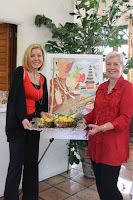From Inc. Magazine
Self-promotion is a necessary evil for anyone starting a business. Here's how to do it so you don't seem like you've sold out.
iStock
Of course it is ideal to have non-related parties evangelizing your product, but there are a plethora of great products launched daily and few of them break through the noise. Many products well-established today spent much of their early days tooting their own horn.
First of all, I understand why many people find self-promotion difficult:
- It feels skeevy. Nobody likes a braggart. I was told as a young girl, “Let your accomplishments speak for themselves.”
- You’ll lose followers. Related to the first point, many people find self-promotion to be in bad taste.
- It seems unauthentic. If you’re so great, why isn’t everybody talking about you?
But why would your friends be uncomfortable with your success? Alain de Botton says it best in Status Anxiety:
It is the feeling that we might be something other than what we are—a feeling transmitted by the superior achievements of those we take to be our equals—that generates anxiety and resentment.”When the success of your peers exceeds your own, you naturally compare yourself and feel envy. Of course, it’s not up to you to protect your friends’ feelings—you have a business to build. But when faced with the choice between making accomplishments known or keeping friends, most would feel heartless if they chose to brag a bit. But there are ways to toot your own horn tastefully (and keep your friends):
- Tell the story of the struggle behind the success. Great! You won an award or got funding or the like. Show how hard you worked and the obstacles you needed to overcome to achieve this milestone. It’ll soften the blow for those who are still in the middle of a struggle.
- Be excited, but be humbled. It pays to throw an ‘aw shucks’ into a news broadcast. I’ve watched many peers do this brilliantly. “We just launched our beta. It’s really rough, but I’d love your feedback.”
- Give credit where credit is due. When you are promoting, it helps to acknowledge the support and advice of people you are close with. “If it weren’t for those late-night chats, I would have never gotten through the rough parts.”
- Enlist the help of your friends to get the word out. Maybe your friends are tired of hearing you talk incessantly about your start-up, but have you ever sat down with them to get them on board? Asking for help shows your friends that you need them.






































After hanging up the phone, my father turned to my mother and said, “We might as well stop unpacking and move back to NY. I’ve just ended my career in Hollywood.”
But surprisingly, the phone rang a few minutes later; it was Zanuck’s secretary, this time asking, “Would it be ‘convenient’ for you to meet with Mr. Zanuck on Sunday?” My father’s point was that people respected others who had the strength of their convictions and didn’t complain about the fact that their religion ‘prevented’ them from doing something they wanted to do.
My father once got a call from an actor who was required to film a scene on the Sabbath, and didn’t know what to do. My father asked, “How much would it cost to film on Sunday, instead.” The actor replied, “$10,000.” My father said, “Then tell them you’ll pay $10,000 to film on Sunday, instead.” The director realized the actor was serious about not being able to film on Saturday, and changed the filming schedule.
Of course, my father occasionally liked to go out of his way to emphasize his ‘Jewishness.’ Also early in his career, when someone (an agent?) recommended that he change his first name because Simon sounded “too Jewish.” He agreed, and changed it to ‘Shimon.’
In spite of this, Mr. Gould is also right that there are plenty of people who would be happy to see Jews gone from Hollywood, just as many would like us to see us gone from Wall Street, medicine and law (all professions that Jews wound up in because they were prevented from being in the metalworking and woodworking guilds back in the 1600s). It's one reason some people don't believe, and resent Jews referring to themselves as "2% of the U.S. population." How can that be when we seem to be overrepresented in certain fields (but not only the top fields; apparently more than 2% of U.S. Federal prison inmates are Jewish). What must be true is a statement attributed to Jackie Mason: "Jews are like everyone else -- only more so."